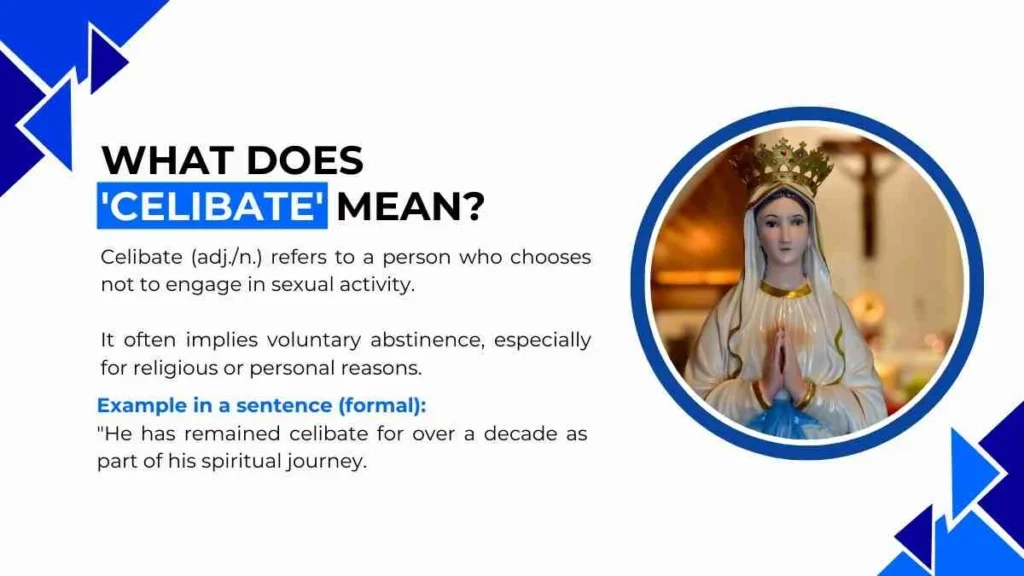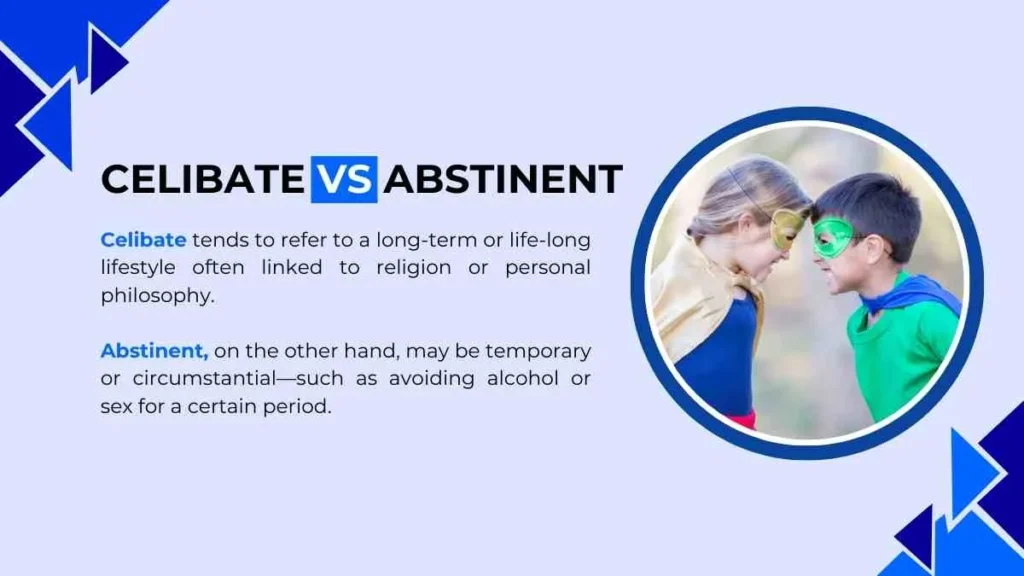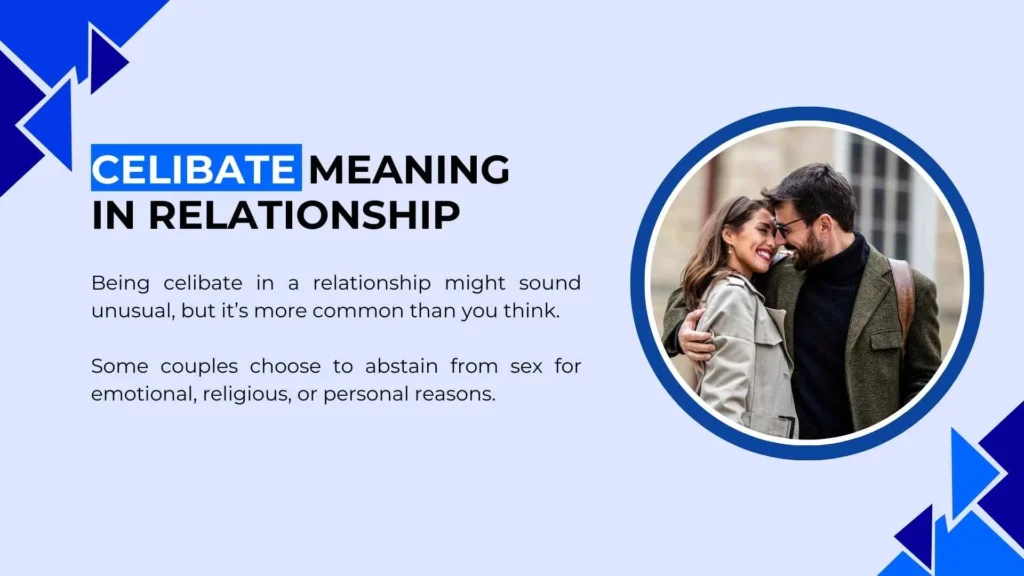Celibacy is a word steeped in historical, cultural, spiritual, and even medical relevance.
While it may appear simple on the surface, its nuanced usage in modern communication—particularly in English text—deserves a deeper dive.
This comprehensive guide explains what ‘celibate’ means, its etymology, how it’s used in different contexts, and why it’s still a significant term in 2025.
We will also explore 10 powerful alternatives and synonyms that capture similar meanings depending on tone, setting, and intention.
What Does ‘Celibate’ Mean?

Celibate (adj./n.) refers to a person who chooses not to engage in sexual activity. It often implies voluntary abstinence, especially for religious or personal reasons.
In religious settings, celibacy is sometimes a vow, while in secular life, it may be a lifestyle choice.
- Example in a sentence (formal): “He has remained celibate for over a decade as part of his spiritual journey.”
- Example (casual): “She’s celibate by choice, focusing on herself right now.”
Root and Etymology
The term originates from the Latin word “caelibatus,” meaning unmarried status or abstaining from marriage and its physical obligations.
Over centuries, the term evolved to more broadly mean abstinence from sexual relationships, not merely from marriage.
Celibate vs. Abstinent

These two terms are often confused, though they carry distinct connotations:
- Celibate tends to refer to a long-term or life-long lifestyle often linked to religion or personal philosophy.
- Abstinent, on the other hand, may be temporary or circumstantial—such as avoiding alcohol or sex for a certain period.
Key Distinction: All celibates are abstinent, but not all abstinent people are celibate.
💢 Involuntary Celibate Meaning
An involuntary celibate—often abbreviated as incel—refers to someone who wants a romantic or sexual relationship but is unable to form one despite trying.
- It’s not a chosen lifestyle.
- Often linked to frustration or emotional distress.
- The term has gained attention online, sometimes in negative or controversial contexts.
- It highlights a lack of intimacy rather than a conscious choice.
- Involuntary celibacy is often discussed in forums about dating struggles and social isolation.
🧠 Fun Fact: The term “incel” originated in the 1990s by a woman trying to create a support community—before it was co-opted by online subcultures.
🌿 Being Celibate Meaning
Being celibate means choosing to abstain from sexual activity, either temporarily or permanently.
- Some people practice celibacy for religious or spiritual reasons.
- Others choose it for personal growth or emotional healing.
- Celibacy doesn’t always mean avoiding relationships—just physical intimacy.
- It can be a lifelong vow or a phase of self-reflection.
- Many find clarity and peace through this commitment.
🔍 Tip: Being celibate isn’t just about sex—it’s often a holistic lifestyle decision involving mindset and emotional well-being.
📖 Celibate Meaning in English

The celibate meaning in English is straightforward: a person who does not engage in sexual relationships.
- The word comes from Latin “caelibatus” meaning “unmarried status.”
- In formal definitions, it often implies abstaining from marriage and sex.
- Commonly associated with religious figures like priests or monks.
- It’s a gender-neutral and non-age-specific term.
- Can be voluntary or involuntary depending on the situation.
📘 Example: “He remained celibate for most of his life due to his spiritual beliefs.”
🚫 Going Celibate Meaning
Going celibate means actively choosing to stop engaging in sexual activities—often for a personal, emotional, or spiritual reason.
- It’s like pressing pause on intimacy to focus on self.
- Some do it after a breakup, others for clarity or faith.
- This choice can be temporary or permanent.
- It doesn’t mean one dislikes sex—it’s about control and reflection.
- Often part of healing journeys or religious commitments.
💬 Real Talk: “I’m going celibate for a year to work on myself” is something more people are saying these days!
Usage of ‘Celibate’ in 2025
The word ‘celibate’ in 2025 is more multifaceted than ever before. With increased conversation around consent, autonomy, and identity, choosing celibacy is less stigmatized and more openly discussed.
Trending Contexts:
- Mental health & healing: Used by individuals opting for a break from intimate relationships to focus on themselves.
- Digital celibacy: A growing trend involving withdrawal from digital dating or online intimacy.
- Religious practice: Still common in clergy and spiritual communities, particularly in Christianity, Hinduism, and Buddhism.
Synonyms & Alternatives to “Celibate”
Depending on the tone—casual, polite, or professional—you might want to use alternatives. Here are ten excellent options to keep your language dynamic and contextually appropriate.
1. Abstinent
Use in context: “He is abstinent as part of his health journey.”
- This is the closest synonym and widely understood.
2. Chaste
Use in context: “She chose a chaste lifestyle, grounded in her spiritual beliefs.”
- Conveys a moral or spiritual aspect.
3. Sexually inactive
Use in context: “He is currently sexually inactive by personal choice.”
- Direct, modern, and often used in medical or psychological discussions.
4. Uninvolved
Use in context: “I’m uninvolved romantically and sexually at the moment.”
- Offers a softer, more general tone.
5. Single and focused
Use in context: “She’s single and focused on her career now.”
- Emphasizes the empowerment angle, often seen in casual speech.
6. Non-sexual
Use in context: “They are in a non-sexual partnership.”
- A more technical term, often seen in LGBTQ+ contexts or platonic partnerships.
7. Solo
Use in context: “He’s gone solo for a while—no dating, no hookups.”
- Informal and relatable for younger audiences.
8. Purposely single
Use in context: “She’s purposely single as a form of self-care.”
- Adds intentionality to the term.
9. Romantically disengaged
Use in context: “He’s romantically disengaged by choice right now.”
- Sophisticated phrasing often used in self-help or psychological articles.
10. Asexual (in some cases)
Use in context: “They identify as asexual and do not seek sexual connections.”
- Not all celibates are asexual, but some overlaps exist.
California celibate meaning
In California, the term celibate holds the same core meaning as anywhere else—it refers to someone who chooses to abstain from sexual activity, either temporarily or permanently.
However, in the context of California’s diverse culture, celibacy can be embraced for a wide range of reasons.
From spiritual practices in yoga retreats to personal growth journeys in wellness communities, many Californians explore celibacy as a way to reconnect with themselves.
Whether part of a religious path or a lifestyle experiment, celibacy in California often leans toward self-awareness and intentional living.
Remain celibate meaning
To remain celibate means continuing a personal commitment to abstain from sexual activity.
People choose to remain celibate for a variety of reasons—religious vows, personal trauma, emotional healing, or simply a desire to stay focused on personal or professional goals.
Remaining celibate can be a long-term choice, like in the case of monks and nuns, or a temporary decision during a certain phase in life.
It’s a conscious effort to stay aligned with one’s values or emotional needs.
Staying celibate meaning
Staying celibate emphasizes the ongoing effort to avoid sexual relationships.
It’s not just about refraining from sex—it’s also about managing urges, staying mindful of triggers, and aligning actions with intentions.
For some, it’s part of a spiritual journey; for others, it’s about healing or rediscovering self-worth.
Staying celibate may involve setting clear boundaries, avoiding romantic distractions, and focusing energy inward—especially during times of transition, grief, or self-renewal.
Celibate meaning in the Bible

In the Bible, being celibate is closely tied to spiritual devotion.
Paul the Apostle, in the New Testament, advocated celibacy for those who could manage it, suggesting that it allowed believers to focus more fully on God (1 Corinthians 7).
Biblical celibacy often meant living a life completely dedicated to God’s service without the responsibilities of marriage.
It wasn’t seen as mandatory, but as a higher calling for those who were able. Religious figures like Jesus and Paul are considered examples of celibate lives lived in deep spiritual commitment.
I’m Going Celibate Meaning 🙅♂️💭
When someone says I’m going celibate, they usually mean they’ve decided to abstain from sexual activity—either temporarily or for the long haul.
People choose celibacy for all sorts of reasons:
- Personal growth or healing after a breakup
- Religious or spiritual practices
- A desire to focus on career or goals
- Asexuality or lack of interest in sexual relationships
It’s not always a permanent decision—it can be part of a phase of self-discovery or emotional recovery.
Bi-Celibate Meaning 🤔🏳️🌈
Bi-celibate is not a widely recognized or mainstream term, but in context, it can mean:
- A bisexual person who has chosen to be celibate
Because the term is not commonly used in academic or medical circles, its meaning often depends on the speaker’s intent.
Celibate Meaning Urban (Urban Dictionary Take) 🏙️😏
According to Urban Dictionary, celibate can take on a more sarcastic or playful tone. Here’s how it’s often used online:
- Unintentionally celibate (aka involuntary celibate or incel)
- “Dry spell” jokes—when someone hasn’t had sex in a while
- Lifestyle meme—as part of challenges like “No Nut November”
So while the real meaning is sexual abstinence, urban slang sometimes turns it into a pop culture joke.
Celibate Meaning in Arabic 🌙📿
In Arabic, celibate translates to:
عازب عن العلاقات الجنسية
This means a person who abstains from sexual relations.
Some other related Arabic terms:
- عزوبة – Celibacy (noun form)
- رهبانية – Monastic celibacy (usually religious)
Celibacy is respected in many Arabic-speaking cultures, especially in religious contexts like Islam and Christianity.
Celibate Meaning in Kannada 📿🇮🇳
In Kannada, celibate is translated as:
ಬ್ರಹ್ಮಚಾರಿ (Brahmachari) for males and
ಬ್ರಹ್ಮಚಾರಿಣಿ (Brahmacharini) for females.
These words are often tied to Hindu philosophy, where celibacy (Brahmacharya) is a spiritual discipline. It’s one of the key stages in a traditional Hindu life cycle, especially for students or monks.
Celibate meaning in relationship

Being celibate in a relationship might sound unusual, but it’s more common than you think. Some couples choose to abstain from sex for emotional, religious, or personal reasons.
This could be before marriage, during spiritual growth periods, or while one or both partners are healing from past experiences.
Celibacy in a relationship can also mean prioritizing emotional intimacy over physical connection, proving that love and commitment aren’t defined solely by physical expression.
It requires clear communication, shared values, and mutual respect to work well.
How to Choose the Right Term
Choosing between “celibate” and one of its alternatives depends on audience, intended tone, and specific context. Below are some helpful tips:
Formal Settings
Use words like celibate, chaste, or abstinent when writing academically, religiously, or medically.
Casual Conversations
Opt for solo, purposely single, or single and focused to keep things light and modern.
Identity and Empowerment
In LGBTQ+ or personal-growth contexts, asexual, non-sexual, or romantically disengaged may be more precise.
“Language evolves. So does how we identify and express our choices. The word ‘celibate’ now carries more freedom and less judgment.”
Popular Phrases and Idioms Using “Celibate”
- “Living a celibate life” – Emphasizes lifestyle choice.
- “Vow of celibacy” – Often used in religious or spiritual contexts.
- “Choosing celibacy” – Highlights autonomy and intent.
- “Embracing celibacy” – A more empowered tone.
Final Thoughts
In 2025, celibacy is no longer seen only through religious or outdated lenses.
It is a valid, empowering, and sometimes healing choice that reflects changing attitudes towards relationships, identity, and self-care.
Whether temporary or lifelong, chosen or circumstantial, being celibate means something deeply personal.
When discussing or writing about celibacy, always be sensitive to tone, context, and the individual’s lived experience.
Language is a powerful tool—and with so many thoughtful alternatives available, you can always find the right words.










